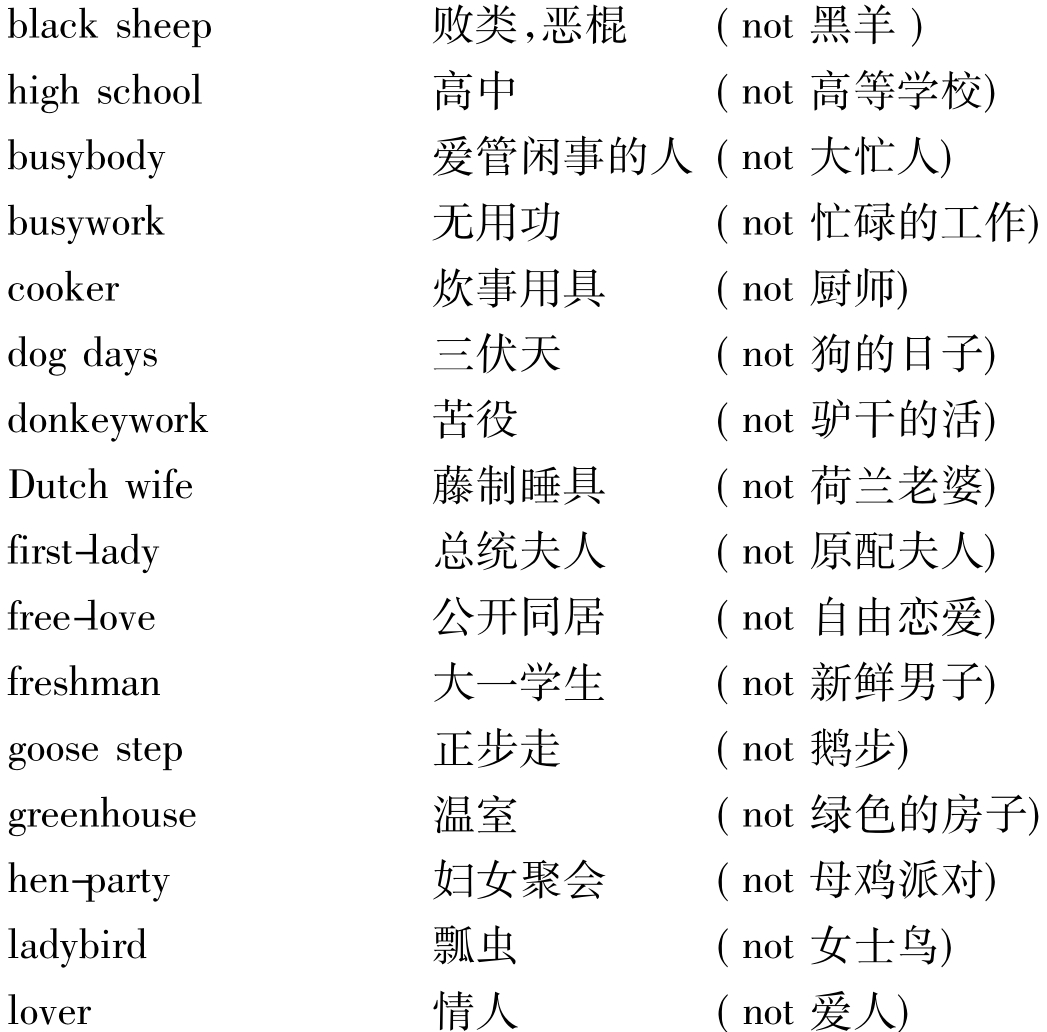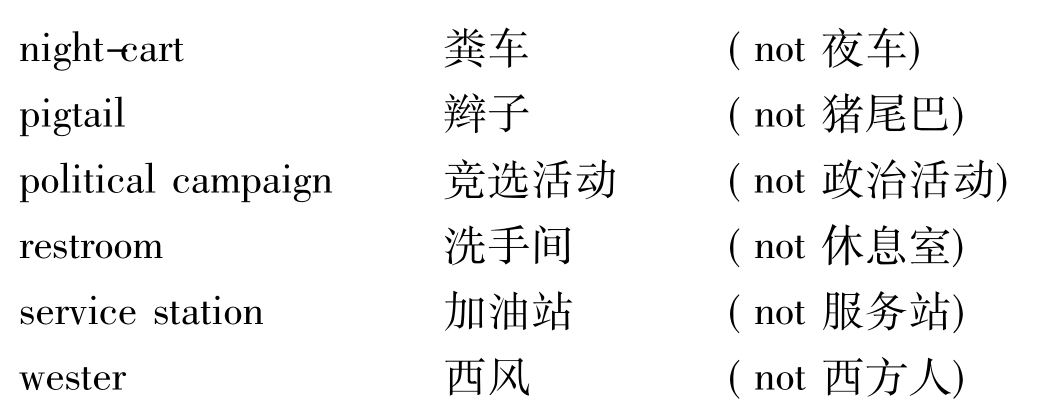4.4. 1 Words and Conceptual Meaning单词与概念意义
4.4. 1 Words and Conceptual Meaning单词与概念意义
English has developed and has been used in English speaking countries that have geographical,historical and other cultural features that cannot be found in Chinese culture.Thus many English words referring to these culture-specific features convey the conceptual meaning that does not exist in Chinese culture.Even if there are translation equivalents in Chinese to these English words,they are only used to refer to specific features of English culture.For example,we may read the English words or phrases like“crocodile tears” ,“olive branch” ,“sour grapes” ,“white pollution” ,“Internet” ,“e-commerce” ,etc.Their equivalents are鳄鱼眼泪,橄榄枝,酸葡萄,白色污染,因特网,电子商务.Actually,they are a coincidence on the one hand,and people live on the same earth and have some similarities in the two cultures on the other hand.We,of course,also realize that cultures among nations are influenced and infiltrated with each other.
Many English words are related with geography,history,politics,Christianity and living styles.This is because each language is spoken within its geographical boundaries.There are many words in each language that refer to geography related features,such as places in these areas and plants and animals living in this climate.For instance ,“the Mississippi”stands for a long river located in the States,and its version is密西西比河,“London”is the capital of the UK,so we may translate it into伦敦,and“kangaroo”is a kind of animal originally living in Australia,so we can translate it into袋鼠.
Each culture has its own history,which is represented in language.When we come across the word “hippie” (嬉皮士),we ought to know its background.It has been referred to a young man or woman who rejects authority,existing institutions and conventional attitudes towards morality,style of dress,etc.in the U.S.since the 1960s.The word “castle” (城堡)means a fortified building or a group of buildings within a defensive wall in ancient England.
Some words illustrate the relationship between words and politics.The word“congress” ,for example,is the federal legislature of the U.S.The Chinese version is美国国会.The term“Prime Minister”is the leader of the British government.So its Chinese version is英国首相.
In English many words are related to Christianity and holidays which are sometimes foreign to most of the Chinese people.The word “trinity” (三位一体),for example,is the union in one Godhead of three persons,Father(圣父),Son(圣子)and Holy Ghost(圣灵).The holiday“Boxing Day”is the first weekday after Christmas,a legal holiday in England,Wales,Northern Ireland,New Zealand,Australia and South Africa.Christmas boxes are traditionally given to dustmen,postmen and a few other public servants.We,therefore,translate it into节礼日rather than拳击日.“Easter”should be translated into复活节instead of东方人.
Many English words reflect the living style of English speakers.First of all,native speakers of English normally live on what we call western-style food and drink.A few instances are cited to show the importance of this point.“Pudding” (布丁)is a sweet dish typically composed of fruit and flour and fat,boiled or streamed,or of fruit baked with pastry,or of cereals baked in milk,or of creams,custards,etc.“Cocktail” (鸡尾酒)is a drink of spirits mixed with others or with various flavorings.We make every effort to be familiar with such words related to the living style.It is easy for us to handle these words in English.But sometimes it is a little bit difficult for us to deal with some words reflecting the living style.The word “privacy”in English readily reflects the principal contrast between English and traditional Chinese cultures.“Privacy” ,interpreted as“freedom from undesirable intrusions”and regarded as a human right,has no appropriate equivalents in Chinese.Even though隐私is used as its translation equivalent,the Chinese term does not sound so pleasant to the majority of the Chinese people.It may imply that some secret is purposefully kept from those who have the right to know it.The Chinese saying好事不怕人,怕人没好事is still frequently heard,which leaves no room for“privacy” .We suggest the translation version of“privacy”私事rather than隐私.It is just like the English term“love store”which should be translated into色情商店instead of爱情商店.“Striptease”is脱衣舞not布条取乐.Chinese who know only a smattering of English have been known to introduce a companion as “my lover” ,which causes foreigners to stare in surprise.Actually,the companion is not a lover,but the person's spouse,not情妇,情夫,but爱人,丈夫or妻子.The term爱人,literally meaning the person one loves,obviously needs a different rendering in English—simply “husband,wife,fiancé or fiancée” .Here let us compare some of English words and what may be mistaken for their equivalents in Chinese:


Just a few are here listed for words and conceptual meanings.In fact there are a great number of words like these in English.This requires us to concentrate on words and their conceptual meanings while translating.We cannot understand and use them literally and directly.
Here it is worthwhile to mention that some words are generally considered pejorative in one language,but not generally in the other.For example ,“ambitious” (野心勃勃)and“equalitarian”(平均主义的)are pejorative in Chinese but positive or neutral to most Americans.On the contrary ,“propaganda” (宣传)and“do-gooder”(社会改良家)are pejorative to most Americans,but positive or neutral in Chinese.